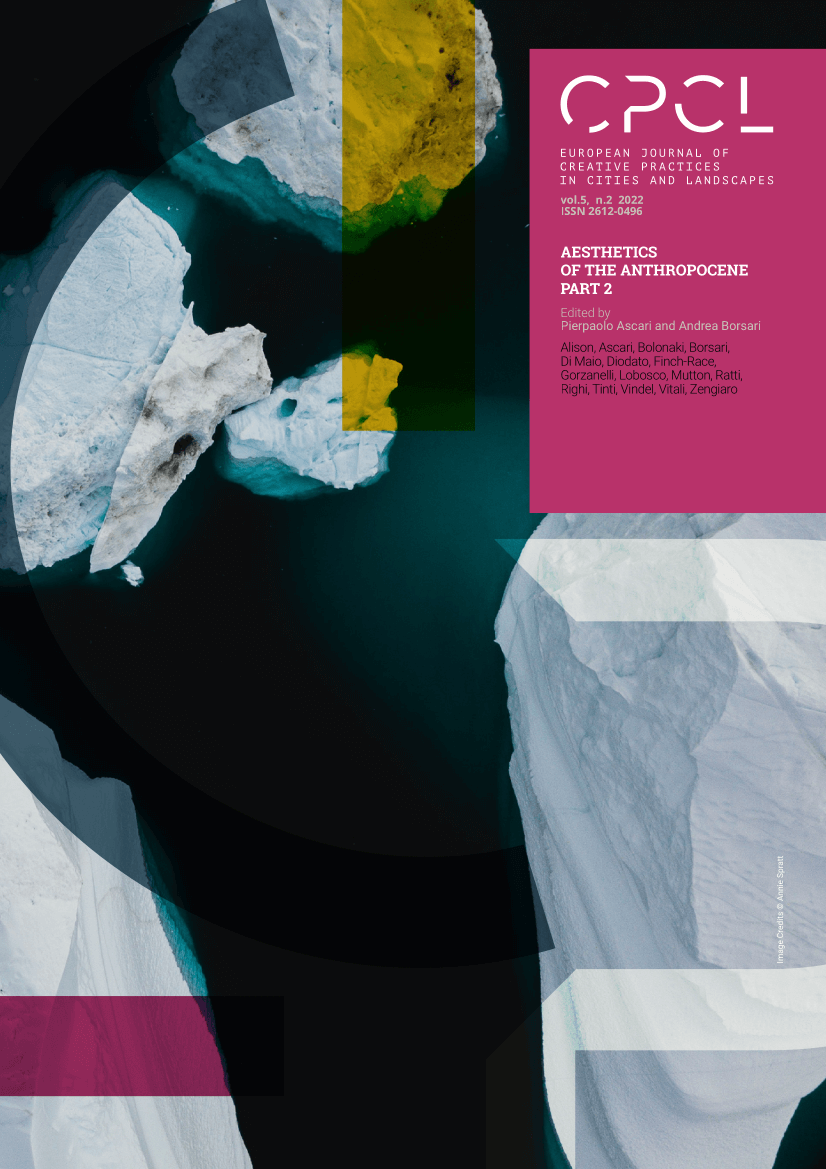The Form of Happiness. Some Remarks on Art, Mimesis and Technology in the Wake of Adorno’s Conception of Natural Beauty
DOI:
https://doi.org/10.6092/issn.2612-0496/14728Keywords:
Theodor W. Adorno, Natural Beauty, Artwork, Technology, MimesisAbstract
The article investigates the relationship between the concepts of mimesis, technology and art in Adorno, in the light of some epistemological implications of the Anthropocene. In order to do so, it starts from the problematic concept of natural beauty, by showing its internal dialectic between social and natural moments. Then, an interpretation of the work of art is proposed, which identifies its natural moment in the peculiar kind of productive praxis that takes place within it. Art in this sense is a mimetic technology that does not only imitate art as an object, but also imitates the productive process of nature. Finally, on the basis of this mimetic moment, the article analyses the emancipatory potential of art, interpreted as a form of transformative praxis, which modifies the relationship between technology and nature.
References
Adorno, Theodor W. Aesthetic Theory. London: Continuum, 2002.
———. Against Epistemology: A Metacritique. Translated by Willis Domingo. Cambridge: Polity Press, 1982.
———. Negative Dialectics. London: Routledge, 1973.
———. ‘On Subject and Object’. In Critical Models: Interventions and Catchwords, translated by Henry W. Pickford Introduction by Lydia Goehr, 245–58. New York: Columbia University Press, 2005.
———. ‘The Idea of Natural History’. Translated by Bob Hullot-Kentor. Telos 1984, no. 60 (1 July 1984): 111–24. https://doi.org/10.3817/0684060111.
Adorno, Theodor W., and Max Horkheimer. Dialectic of Enlightenment Philosophical Fragments. Translated by Edmund Jephcott. Stanford: Stanford University Press, 2002.
Benjamin, Walter. Gesammelte Schriften. Edited by Hermann Schweppenhäuser and Rolf Tiedemann. Translated by Pierre Klossowski. Frankfurt am Main: Suhrkamp Verlag, 1974.
———. ‘Theories of German Fascism: On the Collection of Essays War and Warrior, Edited by Ernst Junger’. New German Critique, no. 17 (1979): 120–28. https://doi.org/10.2307/488013.
Bernstein, Jay M. Adorno: Disenchantment and Ethics. Cambridge: Cambridge University Press, 2001. https://doi.org/10.1017/CBO9781139164276.
Bertram, Georg W. Art as Human Practice: An Aesthetics. Translated by Nathan Ross. London: Bloomsbury Academic, 2019. https://doi.org/10.5040/9781350063174.
Blumenberg, Hans. ‘“Imitation of Nature”: Toward a Prehistory of the Idea of the Creative Being’. Translated by Anna Wertz. Qui Parle 12, no. 1 (1 June 2000): 17–54. https://doi.org/10.1215/quiparle.12.1.17.
Chakrabarty, Dipesh. ‘The Climate of History: Four Theses’. Critical Inquiry 35, no. 2 (January 2009): 197–222. https://doi.org/10.1086/596640.
Cook, Deborah. Adorno on Nature. London/New York: Routledge, 2014. https://doi.org/10.4324/9781315730141.
Descola, Philippe. ‘Humain, trop humain’. Esprit, no. 12 (2015): 8–22. https://doi.org/10.3917/espri.1512.0008.
Desideri, Fabrizio. ‘Ratio, Mimesis, Dialectics: On Some Motifs in Theodor W. Adorno’. Discipline Filosofiche. 26, no. 2 (2016): 125–38. https://doi.org/10.1400/247218.
———. ‘The Mimetic Bond: Benjamin and the Question of Technology’. In Walter Benjamin and Art, edited by Andrew E. Benjamin, 108–20. London ; New York: Continuum, 2005.
Dewey, John. Art as Experience. London: Perigee Books, 1980. http://archive.org/details/deweyjohnartasanexperience.
Farina, Mario. ‘Adorno e l’idea della storia naturale’. Intersezioni. Rivista di storia delle idee, no. 2 (2018): 239–64. https://doi.org/10.1404/90481.
Heidegger, Martin. ‘On the Being and Conception of Φύσις in Aristotle’s Physics B, 1’. Man and World 9, no. 3 (1976): 219–70. https://doi.org/10.1007/bf01249371.
Huhn, Tom. ‘Heidegger, Adorno, and Mimesis’. Dialogue and Universalism, no. 11–12 (2003): 43–52.
Johansson, Anders S. ‘Why Art? : The Anthropocene, Ecocriticism, and Adorno?S Concept of Natural Beauty’. Adorno Studies 3, no. 1 (2019): 64–79.
Latour, Bruno. Facing Gaia: Eight Lectures on the New Climatic Regime. Translated by Catherine Porter. Cambridge: Polity Press, 2017.
Lewis, Simon L., and Mark A. Maslin. ‘Defining the Anthropocene’. Nature 519 (March 2015): 171–80. https://doi.org/10.1038/nature14258.
Mathur, Dinesh C. ‘A Note on the Concept of “Consummatory Experience” in Dewey’s Aesthetics’. The Journal of Philosophy 63, no. 9 (28 April 1966): 225–31. https://doi.org/10.2307/2024608.
Matteucci, Giovanni. L’artificio estetico: moda e bello naturale in Simmel e Adorno. Milano: Mimesis, 2012.
Moore, Jason W., ed. Anthropocene or Capitalocene?: Nature, History, and the Crisis of Capitalism. Oakland, CA: PM Press, 2016.
Pickford, Henry W. ‘Poiêsis, Praxis, Aisthesis: Remarks on Aristotle and Marx’. In Aesthetic Marx, edited by Samir Gandesha and Johan Hartle, 23–48. London: Bloomsbury, 2017.
Schmidt, Alfred. The Concept of Nature in Marx. London: Verso Books, 2013.
Vattimo, Gianni. ‘Il concetto di fare in Aristotele’. In Opere complete I. Ermeneutica tomo 1. Milano: Meltemi, 2007.
Downloads
Published
How to Cite
Issue
Section
License
Copyright (c) 2022 Rolando Vitali

This work is licensed under a Creative Commons Attribution 4.0 International License.




